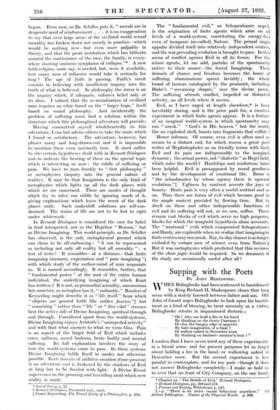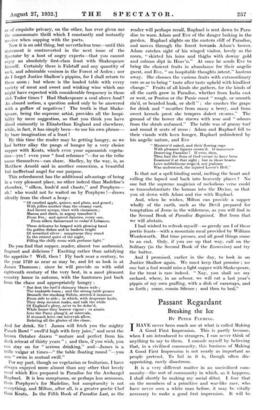Supping with the Poets
BY JOHN BERESFORD.
WTHEN Bolingbroke had been sentenced to banishment by King Richard II, Shakespeare closes that long scene with a stately farewell between father and son. Old John of Gaunt urges Bolingbroke to look upon his banish- ment as a kind of blessing, to treat necessity as a virtue. Bolingbroke retorts in impasSioned rhetoric ;
" Oh ! who can hold a fire in his hand By thinking an the frosty Caucasus ? Or cloy the hungry edge of appetite By bare imagination of a feast ?
Or wallow naked in December snow By thinking on fantastic summer's heat ? "
I confess that I have never tried any of these experiments in a literal sense, and for present purposes let us forget about holding a fire in the hand, or wallowing naked in December contemplate, But the second experiment is less painful to contemplate, and for my part—though it does not answer Bolingbroke completely—I make so bold as to aver that no feast of City Company, on the one hand, * Chapter on " The Riddle of Evil," Zermatt Dialogues. t Zermatt Dialogues, pp. 399 and 478.
Process and Reality, Whitehead, p. 237. § e.g. " Them is no strict causal behaviour anywhere:" Arthur Eddington. Nature of the Physical World. p. 309. Sir or of exquisite- privacy, on the other, has ever given me the consummate thrill which I constantly and instantly receive when supping with the poets.
Now it is an odd thing, but nevertheless true—until this statement is controverted in the next issue of the Spectator by a host of angry experts—that you cannot enjoy an absolutely first-class feast with Shakespeare himself. Certainly there is Falstaff and any quantity of sack, and admirable venison in the Forest of Arden ; nor do I forget Justice Shallow's pippins, for I shall return to them anon ; but where is the loaded table with every variety of meat and sweet and winking wine which one might have expected with considerable frequency in those rich Tudor times ? Had Shakespeare a soul above food ? An absurd notion, a question asked only to be answered with a guffaw of negatives ! The truth is that Shake- speare, being the supreme artist, provides all the hospi- tality by mere suggestion, so that you think you have dined eminently in Elizabethan England and elsewhere, while, in fact, it has simply been—to use his own phrase— by bare imagination of a feast !
By this time the reader may be getting hungry, so .we had better allay the pangs of hunger by a very choice supper with Keats, which even your squeamish vegeta- rian—yes ! even your " food reformer "—for so the tribe name themselves—can share. Shelley, by the way, is, as Matthew. Arnold said in another connexion, a beautiful but ineffectual angel for our purpose.
This refreshment has the additional advantage of being in a very pleasant place, no other indeed than Madeline's chamber, " silken, hush'd and chaste," and Porphyro- ah ! who would not be waited on by Porphyro !—draws silently from the closet a heap : " Of candied apple, -quince, and plum, and gourd ; With jellies soother than the creamy curd, And lucent syrops, tinct with cinnamon ; Manna and dates, in argosy transferr'd From Fez ; and spiced dainties, every one,
From silken Samarcand to cedar'd Lebanon.
These delicates he heaped with glowing hand On golden dishes and in baskets bright Of wreathed silver : sumptuous they stand In the retired quiet of the night, Filling the chilly room with perfume light."
Do you find that supper, reader, almost too ambrosial, fragrant and delicious ? Exciting rather than satisfying the appetite ? Well, then ! Fly back near a century, to the year 1729 as near as may be, and let us look in at James Thomson ; since he. will provide us with solid eighteenth century of the very best, in a most pleasant country house in autumn, with the huntsmen just back from the chase and appropriately hungry :
" But first the fuel'd chimney blazes wide ; The tankards foam and the strong table groans Beneath the smoking Sirloin, stretch'd immense From side to side ; in which, with desperate knife, They deep incision make, and talk the while Of England's glory, ne'er to be defac'd, While hence they borrow vigour : or amain Into the Pasty plung'd, at intervals, If stomach keen can intervals allow, Relating all the glories of the chase.
And for drink, Sir ! James will fetch you the mighty Punch Bowl " swell'd high with fiery juice," and next the brown October drawn " mature and perfect from his dark retreat of thirty years " ; and then, if you wish, you can stay on for " serious drinking," and—James is a trifle vulgar at times—" the table floating round "—you can " swim in mutual swill."
For my part, though no vegetarian or fruitarian, I have always enjoyed more almost than any other that lovely meal which Eve prepared in Paradise for the Archangel Raphael. It is less sumptuous, or perhaps less sensuous, than Porphyro's for Madeline, but sumptuosity is not everything, and Milton, after all, is a greater poetic Chef than Keats. -In the Fifth Book of Paradise Lost, as the reader will perhaps recall, Raphael is sent down to Para- dise .to warn Adam and Eve of the danger lurking in the garden. Raphael alights on the eastern cliff of Paradise, and moves through the forest towards Adam's bower.
Adam catches sight of his winged visitor, lovely as the morn, " skirted his loins and thighs with downy gold and colours dipt in Heav'n." At once he sends Eve to bring the choicest fruits in abundance for their angelic guest, and Eve, " on hospitable thoughts intent," hastens away. She chooses the various fruits with extraordinary care so as to bring " taste after taste upheld with kindliest change." Fruits of all kinds she gathers, for the kinds of all the earth grow in Paradise, whether from India east or west, or Pontus or the Punic coast " rough, or smooth rin'd, or bearded husk, or shell " ; she crushes the grape for drink and " meathes from many a berry, and from sweet kernels prest she tempers dulcet cr:_ams." The ground of the bower she strews with rose and " odours from the shrub unfumed." The table was of grassy turf and round it seats of moss : Adam and Raphael fell to their viands with keen hunger, Raphael unhindered by his angelic nature, and Eve " Minister'd naked, and their flowing cups With pleasant liquors crown'd. 0 innocence Deserving Paradise ! If ever, then,
Then had the Sons of God excuse to have been Enamour'd at that sight ; but in those hearts Love unlibidinous rei?n'd, nor jealousy Was understood, the injured Lover's Hell."
Is that not a spell-binding meal, melting the heart and calling the lapsed soul back into heavenly places ? No one but the supreme magician of melodious verse could so transubstantiate the human into the Divine, so that you sit down with Adam and rise with Raphael.
And, when he wishes, Milton can provide a supper wholly of the earth, such as the Devil prepared for temptation of Jesus in the wilderness, as you will find in the Second Book of Paradise Regained. But from that we will abstain.
I had wished to refresh myself—so greedy am I of these poetic feasts—with a mountain meal provided by William Wordsworth. But time presses, and all good things come to an end. Only, if you are up that way, call on the Solitary (in the Second Book of the Excursion) and try the butter.
And I promised, earlier in the day, to look in on Justice Shallow again. We must keep that promise ; no one but a fool would miss a light supper with Shakespeare, for the treat is rare indeed. " Nay, you shall see my orchard, where, in an arbour, we will eat a last year's pippin of my own graffing, with a dish of caraways, and so forth ; come, cousin Silence ; and then to bed."



























 Previous page
Previous page